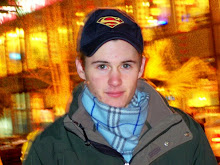All the motherly advice I've ever received in 20 years came into play last night, and although I wouldn't have passed Mom's inconspicuous nightly sniff test, I still returned to my bed in Almaty's train station sober and not-high. (Incidentally, I've found that the best way to sleep on an uncomfortable bed is to start sleeping at 4:30 in the morning.)
Maybe I should explain how I went from being depressed and bored last post to being at a party for rich graduating Kazakhs until almost dawn. As soon as I finished yesterday's post, I went back to my room where I met Nick, a guy from Australia here for a week or so while he gets his India visa set up. We talked for a while, went out for a beer (because I'm pretty sure Kazakhstan doesn't have a law about being 21), and then decided to have dinner. While we were eating some amazing doner (like a Turkish taco), some people happened by speaking English. We started talking to them.
One girl was from Australia, but her multi-national parents also qualified to have a Kazakh and Swiss passport. One guy had missionary parents but was only working himself as a translator. The other girl had just been traveling through when she decided to stay in Bishkek (Kyrgyzstan) and learn Russian, and had just popped up to see the guy, who she was kinda involved with.
Nick and I played pool with the Australian girl, then she talked about how her friend was having a party at which she really needed to make an appearance. We accompanied her, and from there I was introduced to a side of society that I've never seen before.
The kids, around my brother's age, were the richest of the rich. They know Russian, but go to the Baccalaureate school in English because English is powerful. One girl's family is hosting a party at the most exclusive club in town after paying $10,000 for the table. Needless to say, the most exciting thing for them to do is dabble in drugs a bit. At the party a few people were already passed out on the likely-expensive alcohol. Soon after when the weed was passed around, everyone compared their experiences of favorite drugs. Friendly, airy debates were had about the advantages and disadvantages of disassociatives versus stimulants. Much information was disseminated about the availability of drugs in other countries in Asia, since the kids travel whenever they want and we've been traveling through nearby countries ourselves.
I didn't have much to contribute to the conversation, but it was very educational. One girl tried to convince me that having control of my body wasn't what God wanted (they had discovered I was a Christian) because whenever we try to control things we end up with Nazi Germany and other societal evils. I was unpersuaded.
Eventually Nick and I got tired and we left. Then I realized that I forgot my camera and phone there, so my plans for today (which if you recall, were unformed yesterday) consist of me getting my stuff back. I think that's a full day; when you wake up at 2 pm there's a lot less time you have to figure out what to do with.
Friday, June 6, 2008
Subscribe to:
Post Comments (Atom)

3 comments:
didn't we have donor in germany? :) you party animall.
Hey, Will. I stumbled across your blog a days ago while researching my summer trip to China. I find you blog very interesting and hopefully I can hit you up for some info on Chengdu and Beijing. Keep up the great stories. Can't wait to hear about your upcoming 40hr train ride.
OK, I admit, I had no clue what a dissociative drug is. So here is a definition I found (and it gives me the creeps) ...
A dissociative is a drug which reduces (or blocks) signals to the conscious mind from other parts of the brain, typically, but not necessarily, limited to the senses. Such a state of sensory deprivation and dissociation can facilitate self-exploration, hallucinations, and dreamlike states of mind which may resemble some psychedelic mindstates. Essentially, similar states of mind can be reached via contrasting paths—psychedelic or dissociative. That said, the entire experience's risks and benefits are markedly different.
The primary dissociatives are similar in action to phencyclidine (PCP), and include ketamine and dextromethorphan (DXM). Also included are nitrous oxide (laughing gas), salvia divinorum, and muscimol from the amanita muscaria (fly agaric) mushroom.
Many dissociatives also have central nervous system depressant effects, thereby carrying similar risks with opioids that slow breathing and lower the heart rate to levels which can result in death, when used in very high doses.
Their effects are characterized by intense feelings of depersonalization, derealization, and analgesia.
Post a Comment